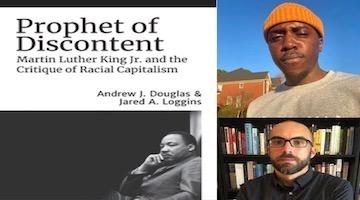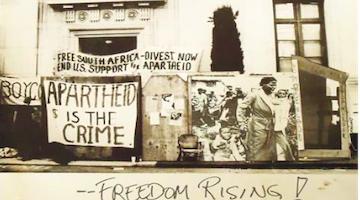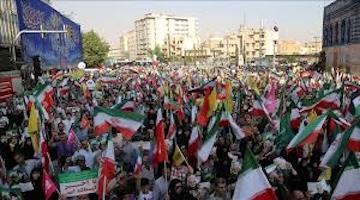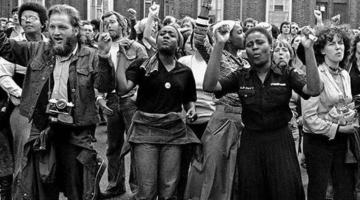Huey P. Newton and Martin Luther King Jr.: Revolutionary Love and Unity
Both Newton and King sought to create a united front for peace and socialism.
“Both refused to be dogmatic and creatively synthesized ideas to apply them in their struggle.”
We live in times of change, in a world where protest and rebellion but also confusion and anarchy define politics. A new world is struggling to be born but the crisis of the system we find ourselves in is simultaneously a crisis of revolutionary leadership. The foremost challenge of our times is the preparation of a revolutionary leadership that will be able to guide the transition to a more humane and just economic and social system. These two past leaders of the Black Radical Tradition provide us with models to study, and it is in their evolution and coming together that the most powerful concepts for revolutionary change are created. Both have superficial differences and similarities but there is a deep underlying unity which we must understand, imbibe and synthesize.
Philosophical influences: Nietzsche and Marx
Both Huey Newton and Martin Luther King Jr. drew from diverse ideological influences. From their reading of Western philosophy, it is their studies of Nietzsche and Marx that stand out. Both read Nietzsche and accept the partial truth in his critique of the Church and the importance of the will to power. Both do not completely accept Nietzsche’s philosophy and reject his elitist and individual conception of power. While accepting the concept of the Will to Power, the Black Panther Party democratized the concept by raising the famous slogan “All Power to the People.” As Huey says:
“When we say ‘All Power to the People’, we mean to convey a sense of deep respect and love for the people, and the idea that the people deserve complete truth and honesty.”
Similarly King criticized Nietzsche for considering love to be a “resignation of power,” and instead emphasized the need for love and power to go together:
“Now, we got to get this thing right. What is needed is a realization that power without love is reckless and abusive, and that love without power is sentimental and anemic. Power at its best, power at its best is love implementing the demands of justice, and justice at its best is love correcting everything that stands against love.”
“Power without love is reckless and abusive, and that love without power is sentimental and anemic.”
What did the two mean by love? For King, the highest expression of love was agape which went beyond romantic love or friendship. Instead, agape was creative and redemptive; it was love for all of humanity, “the love of God operating in the human heart.” Huey would similarly talk about revolutionary love, that went beyond individual relationships, and of love for the people. He says in a poem, “By having no family, I inherited the family of humanity...By rejecting the love of one, I received the love of all.”
Hence, King used the phrase “beloved community” to describe his vision for the future. King believed that our moral progress has not kept up with our technological and scientific progress. He called for a radical revolution of values in American society. Huey would similarly theorize the contradiction between the level of technology and social structure and relations saying that “material conditions exist that would allow the people of the world to develop a culture that is essentially human..The development of such a culture would be revolutionary intercommunalism.”
While the Black Panther Party was a Marxist-Leninist party, Huey rejected any dogmatic application of Marxism and criticized the word “Marxist” particularly as a dogma. He was constantly searching for and developing creative concepts applicable to his time. Hence his theory of revolutionary intercommunalism rose as a means to address the challenge of the stage of capitalism he found himself in. King, meanwhile, as early as 1951 said “I am convinced that capitalism has seen its best days in America, and not only in America, but in the entire world.” He very seriously read Marx and accepted the challenge of Marxism but rightly observed that capitalism in his time was different from the kind of capitalism that Marx had written about. He was never philosophically a Marxist. However, he approached Marx in a dialectical way, accepting his critique of the economic system in operation. In a letter to Coretta Scott King written in 1952, he writes:
“Our economic system is going through a radical change, and certainly this change is needed. I would certainly welcome the day to come when there will be a nationalization of industry. Let us continue to hope, work, and pray that in the future we will live to see a warless world, a better distribution of wealth, and a brotherhood that transcends race or color. “ (emph. mine)
“King approached Marx in a dialectical way.”
Hence King was, from a very early age, looking for an alternative to the stage of capitalism that he found himself in. However, he recognized the need for support from black workers to actually bring about such a change. In his practice, by fighting first against the institutions of racism, and then joining the struggle with the white poor and the fight for peace, King was developing a united front capable of mounting a serious challenge to capitalism in the United States. He recognized the importance of black institutions, and the black church in particular in such a united front.
Writing in 1971, Huey admitted that the Black Panther Party had become “out of favor with the whole Black community” by divorcing itself from the black church. Both King and Huey realized that the church itself had contradictions. Hence, the church itself evolved in King’s engagement with it. Huey recognized both the importance of black institutions and the possibility of engaging them in a united front. He understood the difference between a “hero” and a “vanguard.” A hero is someone who takes courageous actions including supreme sacrifices but isolates himself from the people and hence does not lead the people to a higher level of consciousness. A vanguard is capable of taking the people to a higher level of consciousness. The institutions developed by the Black Panther Party and their community programs are well known.
Looking East: India and China
While well acquainted with western philosophy, both Huey Newton and Martin Luther King were to look east to find a philosophy that was both fulfilling and capable of being used for black liberation. Both saw the African American struggle for freedom as part of the world revolution, including the anti-colonial struggles in Asia and Africa. The Black Panthers opened an office in Algeria and Huey was influenced by reading Fanon. Martin Luther King Jr. met with Algerian leader Ben Bella and had said on his visit to Ghana:
“The road to freedom is difficult, but finally, Ghana tells us that the forces of the universe are on the side of justice.”
While Martin Luther King looked towards India and Gandhi, and adopted the Gandhian technique of nonviolent resistance, Huey was to look towards the experience of China and Mao in searching for a method for black liberation.
The paths that India and China were to take towards liberation from colonial oppression were very different. While Gandhi fashioned the method of “satyagraha” -- translated as “truth-force” or “soul-force” -- Mao was to famously proclaim that “Political power grows out of the barrel of a gun.” The introduction of the method of non-violence to the struggle led to several debates, particularly among revolutionaries. Questions were raised on whether it was merely a tactic or a principle, whether it applied to personal or political interactions, whether violence was a necessary part of revolution in response to the violent nature of the oppressive state. Both sides of the debate ultimately desired peace but differed on the question of means and ends.
“Was non-violence merely a tactic or a principle?”
Before going any further, it should be remembered that Gandhi had said that anything is preferable to cowardice, even violence. King was to clarify many times the difference between non-resistance or passivity and non-violent resistance. He was to respond to the criticism of non-violence many times -- like in his speech Where do We Go From Here, where he said:
“And when one tries to pin down advocates of violence as to what acts would be effective, the answers are blatantly illogical. Sometimes they talk of overthrowing racist state and local governments and they talk about guerrilla warfare. They fail to see that no internal revolution has ever succeeded in overthrowing a government by violence unless the government had already lost the allegiance and effective control of its armed forces. “
Furthermore King said that a revolution, violent or otherwise, requires the sympathy and support of the majority (giving Cuba as an example). He did not believe that it would be possible to get the support of the white majority in the United States in a violent revolution. Hence, King defended the tactic of non-violent resistance as the only possible tactic for black liberation in the United States given the conditions of the modern state.
Huey, on the other hand, famously defended self-defense early in his development. The Black Panther Party did, however, remove the world self-defense from its name later because it was isolating them from the people. In a later interview with William Buckley, he was to say, “I reject violence; there’s no need for it and violence will no longer have to exist. I think that the death of any man diminishes all of us, because we’re all involved with humanity.” Those who claim to be revolutionary cannot ignore the incredible courage and discipline of the Southern freedom fighters in the face of terrorism and oppression.
In our own moment of uncertainty, we cannot afford to disregard any of the revolutionary experiences of the 20th century. They must be studied, imbibed and synthesized. However, we would do well to remember Huey’s words, “The only time an action is revolutionary is when the people relate to it in a revolutionary way.”
Unity and Synthesis
Finally, both Huey and King wanted to give the oppressed a new conception of themselves. They were both searching for a way to make human beings relate to each other in a more humane way. They both recognized the white supremacist nature of the social system that operated in the US and the world. They were both searching for an alternative to the social and economic arrangements of the west. They both sought to create a new vanguard or “a dedicated circle of transformed non-conformists,” in King’s words, that was capable of creating a united front for peace and socialism. They both taught a revolutionary love for the people and an excessive altruism whose logical conclusion is revolutionary suicide.
In the final analysis, both were part of the long black freedom struggle and their own evolution and process reflected the turns of that struggle itself. Both refused to be dogmatic and creatively synthesized ideas to apply them in their struggle. In that process, they have contributed to humanity and it is our task to study them today and search for that new synthesis that will lead humanity to a brighter future.
.Archishman Raju is an organizer with the Free School in Philadelphia.
COMMENTS?
Please join the conversation on Black Agenda Report's Facebook page at http://facebook.com/blackagendareport
Or, you can comment by emailing us at comments@blackagendareport.com



















